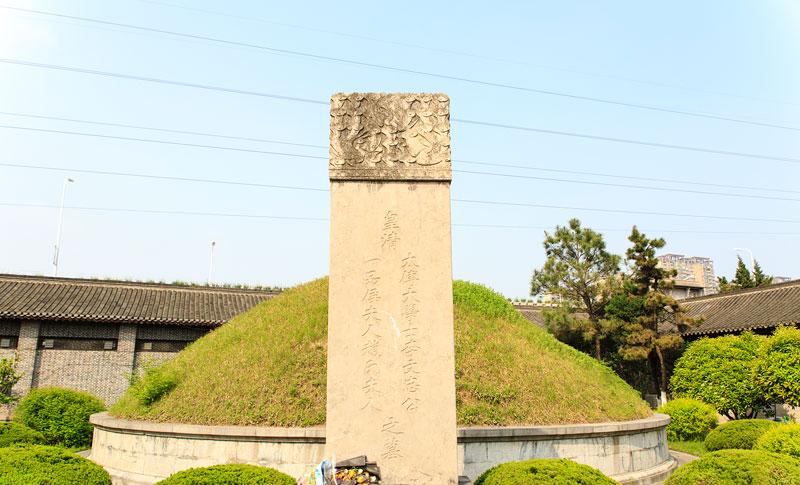One day in 1958, in a part of Daxingji Township, Huainan City, Anhui Province, a loud noise suddenly sounded. As the explosives are detonated, the coffin of Li Hongzhang, who has been buried underground for 57 years, reveals his true face. The people rushed up and swept away the funerary goods in the tomb. Li Hongzhang's bones were tied to a tractor and paraded through the streets until the bones were scattered.

What exactly did Li Hongzhang do? After his death, he was dug up and humiliated, and he was not allowed to rest in peace
Li Hongzhang, one of the four famous ministers of zhongxing in the late Qing Dynasty. After the 17-year-old Zhongxiucai, he rose step by step, and his official fortunes were unimpeded throughout his life.
Empress Dowager Cixi regarded Li Hongzhang as "the one who recreated Xuan Huang" (玄黄). Japanese Prime Minister Itō Hirobumi praised "Li Hongzhang as the only person in the Qing Empire who has the ability to compete with the world powers." Through the unanimous high evaluation at home and abroad, it can be seen that Li Hongzhang is absolutely extraordinary.
As a major minister of the Qing Dynasty, Li Hongzhang had outstanding merits. After the outbreak of the Taiping Heavenly Kingdom Movement, Li Hongzhang was ordered to recruit 20,000 soldiers in just one month. After a short period of training and elimination, he finally formed the famous "Huai Army", which was the core national defense force of the Qing government and the predecessor of the modernization of the Chinese army.
In 1885, Li Hongzhang founded China's first modern navy, the Beiyang Marine Division. As early as the 1870s, the far-sighted Li Hongzhang actively promoted naval construction, he summoned and trained 4,000 navies, ordered 25 ironclad ships, and in just 10 years, he built the most powerful maritime military force in Asia at that time for China.
In addition, during the 30-year-long Foreign Affairs Movement, Li Hongzhang created countless "China Firsts". China's first machine manufacturing bureau, the first telegraph office, the first foreign language translation museum, the first naval base, the first railway, the first batch of official students, and so on. Li Hongzhang has undoubtedly made great contributions to China's modernization process.
However, as a highly controversial figure in history, Li Hongzhang's "two major crimes" are also extremely prominent.
The first crime: embezzlement and enrichment. From ancient times to the present, there have been countless corrupt officials in the political arena, and Li Hongzhang is definitely "among the best" among them.
Regarding the degree of corruption of Li Hongzhang, Rong Hong, the "father of Chinese students studying abroad", has made a detailed estimate. He said that when Li Hongzhang died, his inheritance was as much as 40 million. It should be noted that the 40 million refers to silver two, which translates to at least 10 billion yuan.
Although this figure has not been officially certified, it is indeed an undeniable fact that Li Hongzhang wantonly amassed wealth in the foreign affairs movement. Some people even wrote the slogan "Prime Minister Hefei Is Thin in the World" to satirize Li Hongzhang's corruption crimes.
The second sin: treason. In 1876, Li Hongzhang signed the Sino-British Yantai Treaty with British representatives, adding four treaty ports of Yichang, Wuhu, Wenzhou, and Beihai, and allowing the British to enter Tibet, seriously undermining China's sovereignty.
Since then, with the continuous invasion of Western powers, the Qing government was forced to sign hundreds of unequal treaties such as the Treaty of Tianjin, the Treaty of Maguan, and the Treaty of Xinugu, which completely degenerated into the dish of Western countries. Among them, including the four treaties mentioned above, Li Hongzhang personally signed more than 30 treaties with the great powers.
Although it was the decision of the Qing government headed by Cixi to pay compensation for a short period of peace, Li Hongzhang only signed the agreement as a representative. However, these two sins have already caused Li Hongzhang to degenerate from a respected qing dynasty minister to a "traitor" and "traitor" spurned by everyone. On November 7, 1901, just two months after the signing of the Xinugu Treaty, Li Hongzhang died depressed in a scolding voice at the age of 78.
After Li Hongzhang's death, Cixi was deeply saddened. She not only posthumously knighted Li Hongzhang, but also sent 5,000 taels of silver to treat the funeral. Let Li Hongzhang be buried in the scenery and light.
Empress Dowager Cixi of the late Qing Dynasty
However, no one expected that decades later, Li Hongzhang's tomb would be blown open. In 1958, the captains of 32 production teams where Li Hongzhang's tomb was located dragged dozens of pounds of explosives and directly blew up the solid tomb door. Subsequently, the crowd dragged the coffins of Li Hongzhang and his wife Zhao Xiaolian to the ground and turned over all the funerary items. However, to their surprise, Li Hongzhang's posthumous affairs were handled in a surprisingly simple manner, a pair of glasses, a pocket watch, a cane, a sword and seven coins. Even the two large gold bricks around Zhao Xiaolian were only made of copper after inspection.
This fruitless result completely aroused the anger of those extremists. They cursed Li Hongzhang for his crimes while tying his bones to a tractor with rope. They marched through the surrounding streets in tractors, as if they were heroic heroes who punished "traitors".
After his death, he was humiliated by digging graves and being humiliated, and even his bones were scattered on the ground and mixed into the dust and dirt. Li Hongzhang's fate is both lamented and regretted.